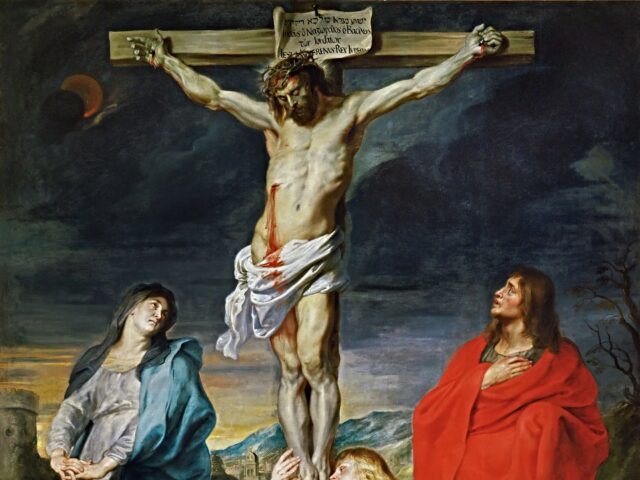Christians observe Good Friday today, solemnly remembering the crucifixion of Jesus of Nazareth, where the faithful believe that the divine Son of God paid the price for sin to reconcile countless people to their Creator through his death on a cross, followed by the bodily resurrection of Jesus Christ on Easter Sunday.
In America’s increasingly secular culture, fewer people than in previous generations are fully aware of what Christians believe regarding Good Friday and Easter Sunday. While these beliefs have not changed for 2,000 years, tens of millions of Americans do not understand that for many millions of their fellow citizens, these beliefs are actually central to views of the meaning of life and death.
The events unfolded on a hill called Golgotha outside the walls of Jerusalem in Israel. As set forth in the Bible in the Gospel of John:
When the soldiers had crucified Jesus, they took his garments and divided them into four parts, one part for each soldier; also his tunic. But the tunic was seamless, woven in one piece from top to bottom, so they said to one another, “Let us not tear it, but cast lots for it to see whose it shall be.” This was to fulfill the Scripture which says, “They divided my garments among them, and for my clothing they cast lots.” So the soldiers did these things, but standing by the cross of Jesus were his mother and his mother’s sister, Mary the wife of Clopas, and Mary Magdalene. When Jesus saw his mother and the disciple whom he loved standing nearby, he said to his mother, “Woman, behold, your son!” Then he said to the disciple, “Behold, your mother!” And from that hour the disciple took her to his own home.
After this, Jesus, knowing that all was now finished, said (to fulfill the Scripture), “I thirst.” A jar full of sour wine stood there, so they put a sponge full of the sour wine on a hyssop branch and held it to his mouth. When Jesus had received the sour wine, he said, “It is finished,” and he bowed his head and gave up his spirit.
—John 19:23–30 (ESV).
Later in the Bible, the Book of Hebrews lays out how Christians understand these events fulfill a system of sacrifices in the tabernacle, and later the temple in Jerusalem, that had been in place for more than a thousand years prior to that. As Hebrews explains:
For since the law has but a shadow of the good things to come instead of the true form of these realities, it can never, by the same sacrifices that are continually offered every year, make perfect those who draw near. Otherwise, would they not have ceased to be offered, since the worshipers, having once been cleansed, would no longer have any consciousness of sins? But in these sacrifices there is a reminder of sins every year. For it is impossible for the blood of bulls and goats to take away sins.…
And every priest stands daily at his service, offering repeatedly the same sacrifices, which can never take away sins. But when Christ had offered for all time a single sacrifice for sins, he sat down at the right hand of God, waiting from that time until his enemies should be made a footstool for his feet. For by a single offering he has perfected for all time those who are being sanctified.
And the Holy Spirit also bears witness to us; for after saying, “This is the covenant that I will make with them after those days, declares the Lord: I will put my laws on their hearts, and write them on their minds,” then he adds, “I will remember their sins and their lawless deeds no more.” Where there is forgiveness for these, there is no longer any offering for sin.
—Hebrews 10:1–4, 11–18.
Many people today would consider it odd – perhaps even absurd – that one person’s death could somehow redeem another person, or on a more basic level the idea that there is a God who created the universe who would later be born into this world as a man to do such things. But followers of Jesus have been hearing that criticism for twenty centuries now, so it appears some things never change.
As one Christian hymn puts it:
Before the throne of God above I have a strong and perfect plea, a great High Priest whose name is Love, who ever lives and pleads for me. My name is graven on his hands; my name is written on his heart; I know that while in Heaven he stands, no tongue can bid me thence depart; no tongue can bid me thence depart.
When Satan tempts me to despair, and tells me of the guilt within, upward I look and see him there, who made an end of all my sin. Because the sinless Savior died, my sinful soul is counted free; for God the Just is satisfied to look on Him and pardon me, to look on Him and pardon me.
—Before the Throne of God Above (1997)
And if people think those things sound crazy, just wait until they find out what Christians believe happened the following Sunday.
Ken Klukowski is a Breitbart News contributor. Follow him on X (formerly Twitter) @kenklukowski.

COMMENTS
Please let us know if you're having issues with commenting.